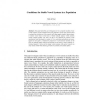Free Online Productivity Tools
i2Speak
i2Symbol
i2OCR
iTex2Img
iWeb2Print
iWeb2Shot
i2Type
iPdf2Split
iPdf2Merge
i2Bopomofo
i2Arabic
i2Style
i2Image
i2PDF
iLatex2Rtf
Sci2ools
111
click to vote
ECAL
2003
Springer
2003
Springer
Conditions for Stable Vowel Systems in a Population
This paper describes an investigation of two computer models of how vowel systems can be transferred from one generation to the next. Humans tend to reduce the articulation of the vowels (and other speech sounds) they produce. If infants would learn on the basis of these reduced signals, vowel systems would collapse rapidly over time. As this is not observed in practice, some mechanism must be present to counter it. Two candidate mechanisms are investigated in this paper: compensatory expansion of articulations learned on the basis of reduced speech sounds and learning on the basis of more carefully articulated speech. It turns out that larger vowel systems with central vowels can only remain stable when learning is based on carefully articulated speech.
Related Content
| Added | 06 Jul 2010 |
| Updated | 06 Jul 2010 |
| Type | Conference |
| Year | 2003 |
| Where | ECAL |
| Authors | Bart de Boer |
Comments (0)

